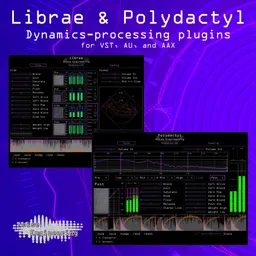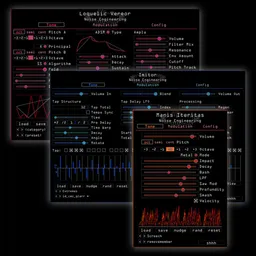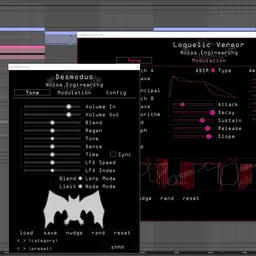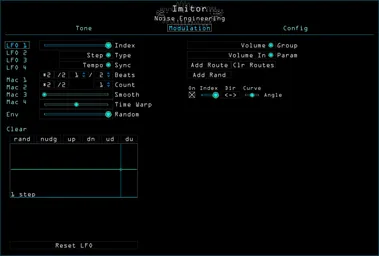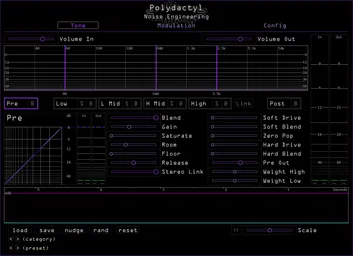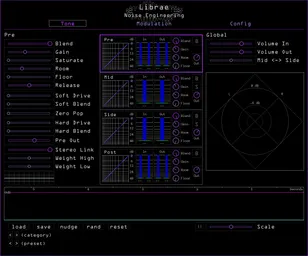We’re very proud to announce that we’ve released two entirely new plugins, Polydactyl and Librae. This time, we’ve moved to a whole new realm: dynamics processing! Don’t worry: along with being transparent and clean when you want them to be, they’ve got some of the signature Noise Engineering flair we all know and love. We designed them to be straightforward and fun yet extremely flexible: whether you need intricate and delicate processing for a mastering task or some complete transformation for your latest sound-design project, there’s something for you in both of these plugins. If you want to pick up your copies NOW, they’re available for a mere $49 each at our webshop. Plus, if you buy 3 plugins, you’ll get one of them for half off!
Sound design to mastering
Both Librae and Polydactyl were designed to be versatile: they can be as transparent or as characterful as you want them to be. I’ve found myself using Polydactyl on individual tracks whenever I’m working on sound design: it’s an excellent tool for emphasizing different parts of the audio spectrum and making things sound more organic with some higher-frequency compression. I also like using Librae to clean up stereo things like reverb, field recordings, and for any synths with a stereo output.
Sound design is one thing, but mixing and mastering is really where these two can shine: I’ve had some wonderful results using Librae on the master bus of more ambient tracks, and Polydactyl on more aggressive mixes. After some balancing, compression, and slight distortion, the final Post section of either is perfect for adding in some intense limiting and bringing a whole mix up in level. Librae and Polydactyl’s transparent limiting lends itself well to increasing perceived loudness and making a final mix that’s big and loud.
Processing structure
We’ll go deeper into how exactly these plugins do what they do in a later post, but a short explanation of the unique techniques used in both Librae and Polydactyl is definitely in order.

Each plugin is split into a number of sections, and each section has similar controls: Gain, Room, and Floor control limiting, compression, and expansion respectively, with Release controlling how aggressive all processing is. Then, there are a number of harmonic controls to add color to your sound: soft clipping, overdrive, and saturation are all available per section. Blend and Out level controls help balance the original signal with the processed result. Finally, stereo sections feature Stereo Link, a control that allows for flexible decoupling of left and right processing, and a detector EQ to change how the processor responds to incoming audio.
That may sound like a lot of controls, but once you’re familiar with them in one section, you can jump to the next one easily: all the controls are shared across all sections in both plugins.
Polydactyl: multiband processing like you’ve never heard before

Polydactyl is designed for multiband dynamics and harmonic processing. We’re big fans of the huge range of utility that a multiband processing structure can achieve, and when set out to create Polydactyl we spent a lot of time designing a fast and easy-to-use workflow. With 6 different sections there are a lot of controls to play with, but our goal from the start was to make it easy to change a sound exactly how you want to with ease. You can hear in the example below just how much of a difference a few simple tweaks make:
Of course, if you’re not in the mood to tweak a lot of parameters, Polydactyl (and Librae, too!) comes with a library of presets designed for a variety of tasks to help you get started.
What is multiband processing?
Multiband processing is a simple concept that’s quite useful in mixing, mastering, and sound design. The input signal is split across a number of bands (in the case of Polydactyl, there are four bands) according to frequency, and each band can be processed differently. For example, if you wanted to tighten up only the low end of a drum recording, you could set the low band to 150hz and add some compression to just that band. Then, you could add some sparkle to the hats and cymbals with the high band set to 5khz, and add some saturation to just that band.
Of course, you don’t always need to adjust individual bands, so you can use the Link control to adjust all four split band settings at once. Or (and!), use the Pre and Post bands to process the entire signal at once.
Librae: mid/side, stereo, and a whole lot of fun

While Polydactyl is all about multiband processing, Librae is designed as a mid/side dynamics counterpart. You’ll notice a similarity in the controls and some of the metering, but its design is more focussed on changes to the stereo field and balance of the incoming signals. In my own workflows, I tend to use Polydactyl on individual instruments, and Librae for broader changes to a submix or as the final processing for a whole session.
Deja vu: what is mid/side processing?
Mid/side processing is a useful way of splitting up a stereo signal. The mid is just the mono portion of the signal (the centermost portion of the mix), and the side is everything except the mono stuff. By changing the level and dynamics of just the side portion of the signal, or just the mid, you can make your mix sound wider and more balanced.
Librae has a dedicated slider for mid/side balance (sometimes I’ll load up Librae just to use that one parameter!) so it’s easy to change the level of mid and side without changing their dynamics at all. Or you can add compression, say, to the Mid processor, and some saturation to the Side, and create a mix that’s wide and bright but retains punchy transients in the center of the stereo field.
Get your copies today
Both Librae and Polydactyl are available for download now from our webshop. As usual, they’re available for Mac and PC as AAX, AU, and VST plugins, so you can use them in whatever host you’d like to! Grab yours today. Your dynamics will thank you.
